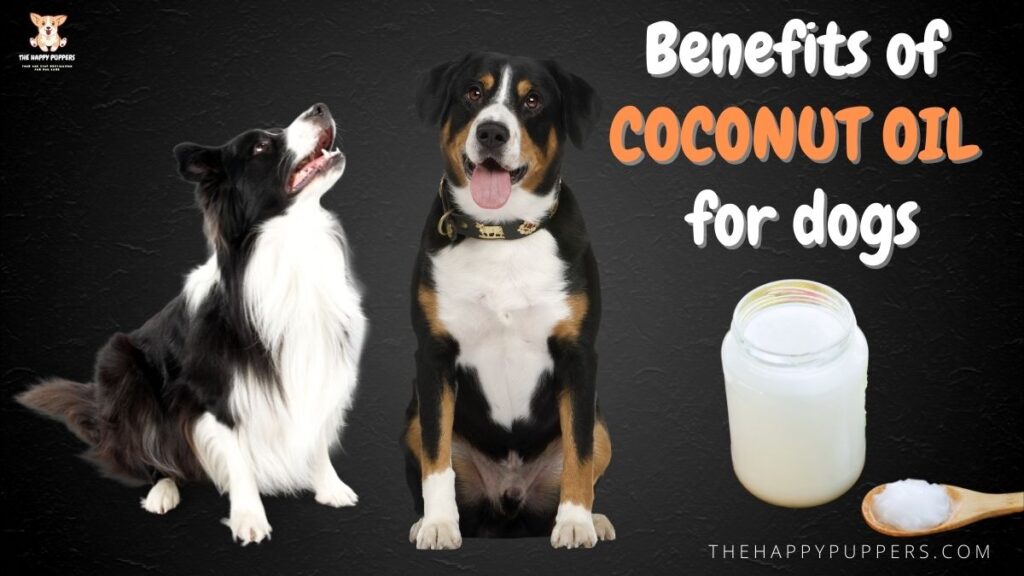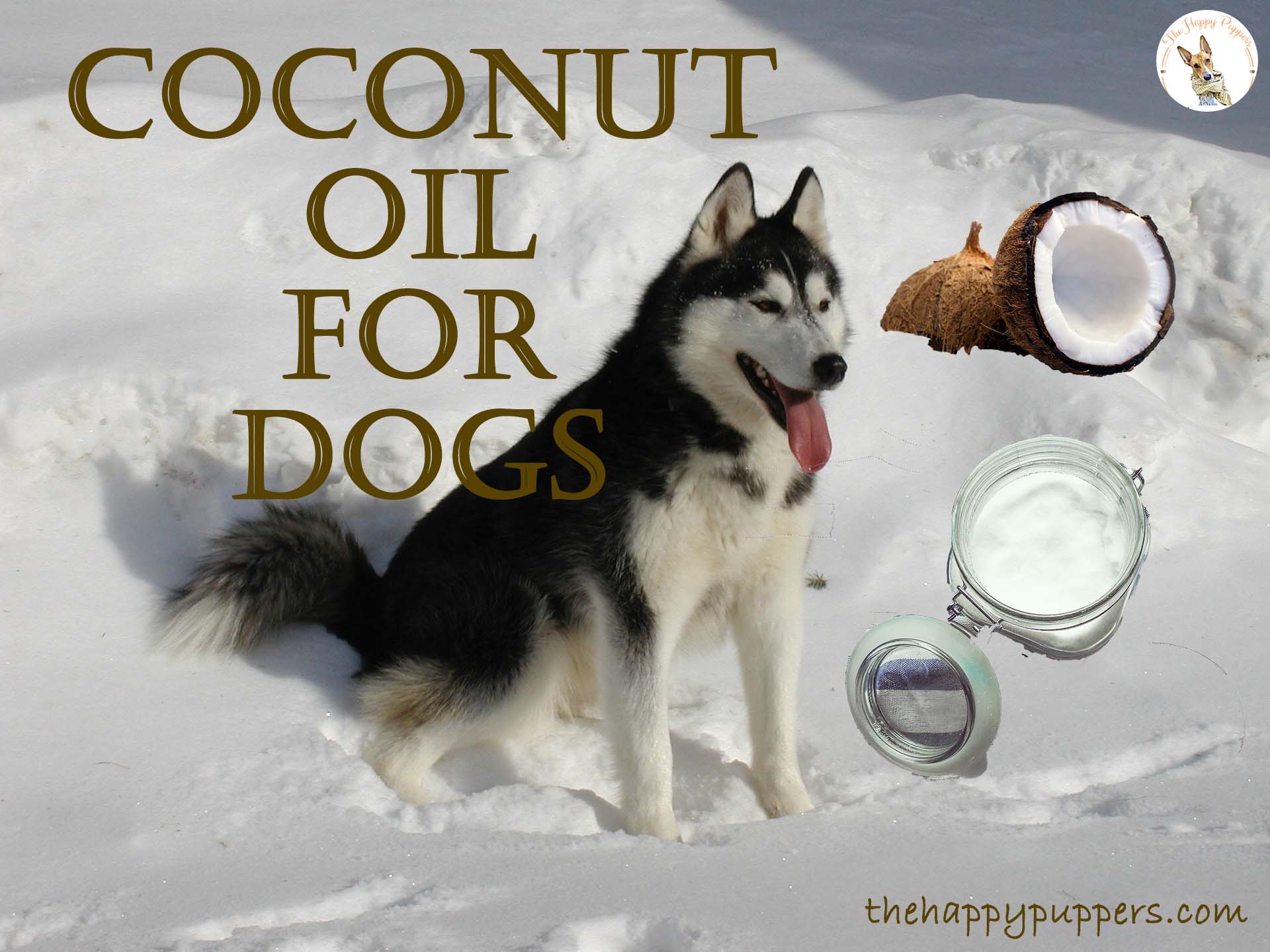In recent times, coconut oil has gained the reputation of being the most sought after oil when it comes to a beauty product or healthy living for humans. However, it is not far behind in the canine world either. Dog lovers/parents are diving in and exploring the benefits of coconut oil for dogs.
I’d say, coconut oil for dogs is Pandora’s box of goodness. In this post, I have done a comprehensive review of the A to Z benefits of coconut oil and I have come up with 22 ways coconut oil can be a boon in your dog’s life. So read till the end to find out why you should buy that organic coconut oil bottle/jar today itself for your dog.
When applied topically:
- Prevents yeast and fungal contact with your dog’s skin.
- Soothes irritated skin, sting, bites, heals cracked paws, abrasions and hot spots.
- Prevents flaking and adds moisture to the skin.
- Keeps your dog’s nails healthy and strong.
- Keeps the fur smooth, soft and prevents the development of bad odor.
- Can act as a natural detangling agent when dealing with matted fur and tangles.
- Prevent excessive shedding by relieving the itch due to allergy mediated skin conditions.
- Acts as a key ingredient for the DIY dog paw balm (link present in the section of coconut oil for dogs paw pads).
How to use on skin:
You can add a few drops of coconut oil to the shampoo and then apply it on your dog’s fur. Coconut oil has also been known to help in case of hotspots in dogs.
As a moisturizer: Rub a few drops of coconut oil on your hands and pat it on your dog’s fur. Make sure you run your fingers through his/her fur and massage it a little down to the skin. You can also apply coconut oil directly on your dog’s skin and
nails once a week.
To treat hotspots in dogs: Apply an even layer of coconut oil on the hotspot region. Make sure that the hotspot area is completely covered. This will keep the area free of bacteria while keeping it moisturized.
To treat mange in dogs: Mange in dogs is caused by infection by parasitic mites. Coconut oil is known to kill mange causing nuts and also prevent any new infections from occurring. Your can also use coconut oil based shampoos to prevent mites infection in your dog.
DIY dog grooming: learn to do it the correct way
Alternatively, you can use 100% virgin coconut oil to lather your dog completely. Take some oil in your fingers and run it through your dog’s coat through the fur to the skin and massage so that the oil sinks into the skin. One tablespoon should be enough to cover your dog completely. Remember to not use too much of oil since this can lead to a buildup of oil on the coat of your dog.
Coconut oil for dogs fur
As a conditioner: Apply some coconut oil on your dog’s coat post-bath when it’s still wet. Let it sit for two minutes and then rinse it off.
For a shinier coat
For humans, their are a ton of products which are available to use for increasing the shine, reducing the frizz, damage control etc. Even though dogs do not need extensive hair care like humans, if it has been a while since their previous trip to the groomers , the coat may look a little dry and dull.
Coconut oil is the easiest to bring back the lost
shine to your dogs coat. The lauric acid present in coconut oil has the ability to enter the hair shaft of the dog. This not only improves the appearance of the dog’s coat, it also improves the overall health of the skin and fur.
Coconut oil to remove matting from dogs fur
If you notice matting on your dog’s fur, massage some warm coconut oil on the fur. Warm coconut oil will help loosen up the mating in your dog’s fur. Allow the oil to sit for a few mins before you start to gently brush your dog’s hair to get rid of the tangles.
To prevent shedding
Coconut oil can help reduce
excessive shedding in dogs. Even though genetics is the primary reason behind dog’s shedding, shedding can increase if your dog has dry skin and coat. Coconut oil can promote a healthier coat and fur in your dog. It will not stop the shedding completely. However, it will make the shedding levels more manageable.
If you are specifically trying to reduce the shedding, apply a slight amount of coconut oil on your dogs fur. Allow it to sit for 5 mins. Following this, rinse off the excess oil with water and towel dry your dog. This process can be done once every week to reduce the shedding.
Coconut oil for fleas
The lauric acid of coconut oil can kill and keep
fleas at bay. Brushing your dogs coat with coconut oil should work as a topical fleas prevention methods.
Coconut oil for dogs eyes:
Coconut oil is the safest option to use around or in your dog’s eyes.
Coconut oil prevents bacteria and yeast buildup. It also creates a water-resistant layer on the skin to repel deposition of tears. Thus, tears are unable to soak into your dog’s skin.
Coconut oil for dog tear stains:
To remove
dog tear stains, massage some coconut oil with a soft lint-free cloth on the stain. If you use a light-coloured cloth, you will see the red or brown matches collecting on your cloth. You should repeat this twice a day until the stain is gone or you don’t see the stain coming off on the cloth anymore.
Coconut oil for treating small wounds in dogs
As I have mentioned before, coconut oil is rich in antibacterial properties. Applying coconut oil on
small wounds and bruises can allow them to heal faster. Coconut oil works similar to Neosporin. Coconut oil also keeps the
wounds from getting infected.
Coconut oil for ear care
Not only can coconut oil relieve the stress and soothe your dog’s ears, it can also remove and repel ear mites (otodectes Cynotis mites). Coconut oil also helps prevent
ear infection in dogs.
How to use coconut oil on dog ears?
Put a small amount of coconut oil on a cotton pad and clean the inside of your dog’s ear canal. You can do this either every day or every alternate day depending on how much your dog’s ear is bothering him/her.
Coconut oil for ear mites
If you notice the presence of lesions or dried blood in your dog’s ears, their is a chance that your dog is infected with ear mites. Coconut oil has antibacterial and antiviral properties which makes it the perfect natural remedy for ear mites. coconut oil can also trap the eggs of ear mites, thus preventing any new ear mites from infecting your dog.
For treatment of ear mites, apply a small quantity of coconut oil on the inside of your dogs ears. Do this everyday for a paid off one week. If you do not notice any decline in the coffee colored extracts, contact your veterinarian.
Coconut oil for dry dog nose
A dogs nose tends to become dry. It is challenging for most guardians to find out what to put on the noses of their dogs because dogs are likely to
lick it off. Therefore, whatever is put on the nose to prevent dryness must also be safely edible. This is where coconut oil comes in. It can prevent the drying of the dog’s nose while being safe for consumption by the dog.
Coconut oil as an antioxidant
Free radicals produced by the body tends to cause ageing in animals and humans. These free radicals steal electrons from other molecules of the cells and cause cell death. Cell death causes ageing of the organism. Free radicals are the reasons behind cancer, degenerative eye diseases and a variety of other diseases which can reduce the life of your pup.
Antioxidants are responsible for destroying these free radicals and prevent ageing. Antioxidants give the electrons to these free radicals so that they don’t steal the electrons from other cells. Coconut oil being a rich source of antioxidants can be very beneficial in prevent ageing in your dog.
Coconut oil for dogs teeth
The antimicrobial properties of coconut oil allow it to prevent harmful bacteria from colonizing your dog’s mouth. Bacteria accumulation in dog’s mouth can lead to
periodontitis and
gum diseases by the time the dog is a couple of years old. It also helps prevent
bad breath.
How to use coconut oil on teeth of dogs?
- You can apply some coconut oil to a slightly damp gauze piece or a soft toothbrush and brush your dog’s teeth gently.
- To target bad breath, add a few drops (1-2) of parsley oil to the toothbrush along with coconut oil.
- You can make a home-made pro-biotic mouthwash for your pup by mixing a human pro-biotic capsule supplement with 1 tablespoon of kefir or coconut milk and provide it to your pup as a post-meal supplement.
Bonus tip:
If your dog is not very fond of dental chews and it’s not possible for you to make him or her brush every day, you can coat the dental chew in coconut oil and provide to him or her. Since dog’s love the flavor of coconut oil he/she would love to chew on the chew bone.
Coconut oil for dogs paws:
Coconut oil can work amazingly well to soothe dry, irritated or flaky paws. If your pup is suffering from torn paw pad, coconut oil can prevent any bacterial infection while helping it heal. The natural antibiotic properties of coconut oil help to soften the paw pads and keep them glistening and infection free. Coconut oil can also keep the paws from getting chemically burned when walking on snow. Check out this
complete guide on paw pad care and how to make the DIY dog paw balm
Coconut oil for dogs brain
This study shed light on another component present in coconut oil i.e. ketones. Ketones are generated in the body when fats are broken down. Ketones play an important role in improving brain health across several species. When dogs consume coconut oil, the fat present in coconut oil gets converted to ketones. These ketones act as alternative brain fuel keeping your dog sharp and intelligent even during his or her advanced years of life.
Coconut oil for dog seizures
It has been observed that the ketones produced by the oxidation of fats present in coconut oil can reduce
seizures in dogs. Another study conducted by NIH found that dogs who were regularly fed coconut oil for a period of three months showed a remarkable reduction in their epileptic episodes.
It is not yet understood as to how ketones reduce epilepsy. However, these results has been observed across several studies. One probable theory is that the brain of such dogs benefit from the presence of an alternative fuel source like ketones. Maybe their brains find it hard to utilize glucose as an energy source, thus the availability of ketones fulfills the energy requirements of the brain and reduces
seizures.
Coconut oil for dog constipation:
When consumed in the diet, the triglycerides of coconut oil get converted into monoglycerides and free fatty acids in the digestive tract. These lead to better nutrient absorption and digestion.
The MCTs in coconut oil destabilize the membranes of the harmful bacteria causing bacterial death. The fatty acids especially caprylic acid and lauric acid kill Candida and other harmful organisms without harming the gut-friendly bacteria.
Coconut oil for kennel cough:
Coconut oil, due to its antiviral property is one of the most helpful
home remedies for healing
kennel cough caused by the Bordetella virus.
Give two teaspoons to your pup daily until the cough is cured.
Also, if your pup’s appetite is suppressed due to congestion, the fragrant aroma of the coconut oil will get some appetite back. Check out this post on complete details regarding
kennel cough in dogs.
Coconut oil for dogs joints:
Coconut oil not only relieves pan in case of arthritic dogs, it can be used to give your pup’s limbs a nice massage after a period of a long walk or hike. Regular use of coconut oil also prevents joint issues and arthritis in senior years of the dog.
For dog arthritis
Regular feeding of coconut oil has been observed to improve mobility and lessen
pain in case of
arthritic dogs.
The MCTs of coconut oil has been observed to reverse the ligament damage which is primarily responsible for aggravating the arthritis symptoms.
Coconut oil for puppies
One of the primary concerns of dog guardians regarding coconut oil is that at what
age should they start using coconut oil for their dogs? Fortunately coconut oil is a safe natural ingredient for use on
puppies as well. By the time the pup is off 4-6 weeks of age (around the time you o bring the
puppy home), he or she is ready to get a free kicks of coconut oil on a daily basis.
Other amazing benefits of coconut oil
- Helps balance insulin levels
- Boosts your pup’s immune system
- Helps control body weight
Bonus tip:
You can coat your dog’s tablets in coconut oil and offer it to him or her. When presented like this, the tablet is considered and eaten as a treat instead of medicine.
Coconut oil for dogs dosage
Coconut oil can cause side-effects like diarrhea or greasy stools. This usually happens if the coconut oil dose is too large. Another point to keep in mind is that you must always check if your dog is allergic to coconut oil before introducing it in his or her regular diet plan. In case you find that your dog is allergic, discontinue use of coconut oil immediately.
How much coconut oil to add in your dog’s diet?
If you have a small dog, you can mix 1 teaspoon of coconut oil (per 10 pounds of body weight) with his or her regular meals. If you have a larger dog weighing at or more than 50 pounds, you may need to add 1 tablespoon (per 10 pounds of body weight) to the meals. Make sure to mix the oil with your dog’s
food and provide it twice a day.
Which coconut oil to use?
Always go for unrefined coconut oil which is also known as virgin coconut oil. The best option is to buy cold-pressed oil as in this method, the oil is processed quickly after the coconuts are harvested allowing preservation of the nutrients. Some coconut oil may have a bold coconut flavor, while others might be bland. Some coconut oils might have a smooth and buttery flavor, while others could have a nutty flavor. You might have to try out different oils to find out which one your dog prefers the most.
Personal Experience
Recently,
Delta faced a severe bout of
constipation. Passing stools was very difficult for him and there was also some blood in his stools. We started him on coconut oil, and within eight hours of the first dose, he could poop without putting too much pressure on himself. We also don’t have to fear to make him take his tablets anymore. We coat it in coconut oil and he eats it like a treat. I am so happy that the days of putting the tablet in his mouth and holding him down so that he swallows it are behind me. I wish I found this sooner.
Conclusion
Now that you know about all the amazing benefits of coconut oil, it’s time to decide whether you want to include coconut oil as a supplement in your dog’s diet. Before the addition of any supplements to your dog’s diet, you must consult your veterinarian. Coconut oil is not a magic fix, but it has definitely worked wonders for my little boy.
In this post, I have tried to include all the health benefits of coconut oil in your dog’s daily regime. If you have any query, kindly mention it in the comment section below and I will try to resolve it to the best of my ability. Further, if you want me to write about a specific topic or make a video covering anything that you wish to know, let me know in the comment section. I will touch upon that as soon as possible.
P.S.: If you found this post informative, please don’t forget to like, comment, and share.


